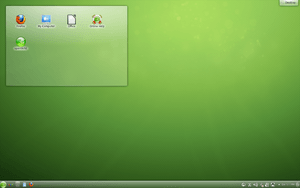OpenSUSE facts for kids
openSUSE (pronounced "oh-pen-SOO-zuh") is a special kind of computer operating system, like Windows or macOS, but it's based on something called Linux. It's a project where many people from a community work together to create and improve it. Big companies like Novell and AMD help support this project.
Back in January 2004, a company called Novell bought SUSE Linux. They decided to make the SUSE Linux Professional software completely "open source." This means its code is free for anyone to see, use, and change. They invited the community to help develop it. The very first version released by the openSUSE Project was a test version of SUSE Linux 10.0. As of January 2016, the most stable version was openSUSE Leap 42.1.
Quick facts for kids openSUSE Linux |
|
|---|---|

openSUSE 12.2 with KDE 4.8.4
|
|
| Developer | openSUSE Project |
| OS family | Unix-like (based on SUSE Linux) |
| Working state | Current |
| Source model | Open source |
| Initial release | December 2006 |
| Latest release | Leap 42.1 / November 4, 2015 |
| Repository |
|
| Marketing target | Consumer, Small Business, Development, Developers |
| Available in | English, German, Russian, Italian, many others |
| Update method | ZYpp (YaST) |
| Package manager | RPM Package Manager |
| Supported platforms | IA-32, x86-64 |
| Kernel type | Monolithic (Linux) |
| Default user interface |
KDE Plasma Desktop |
| License | Free software licenses (mainly GPL) |
| Official website | www.opensuse.org |
What Your Computer Needs
To run openSUSE, your computer needs certain parts. These are called "system requirements." OpenSUSE 11.1 works well with most modern computers. It supports both 32-bit and 64-bit PCs. It also works with PowerPC (PPC) processors.
Basic Computer Parts
Here are the basic things your computer should have:
- CPU (Processor): This is the "brain" of your computer. You'll need an Intel Pentium 1-4 or Xeon, or an AMD Duron, Athlon, Athlon XP, Athlon MP, Athlon 64, Sempron, or Opteron.
- RAM (Memory): This is where your computer temporarily stores information it's actively using. You need at least 256 MB (megabytes). It's better to have 512 MB for smoother performance.
- Hard Drive: This is where your computer stores all your files and programs. You need at least 500 MB for a very basic system. For a normal system with more features, 3 GB (gigabytes) is recommended.
Older processors like the AMD K6/2 can also be used. If you don't need extra languages or a graphical interface, openSUSE can even run on very small systems. For example, a simple router system might only need 300 MB of disk space. It can also work with less RAM, like 128 MB, but it might be slower.
Software Packages
OpenSUSE comes with many official software programs. These are stored in something called a "software package repository." One example of a program you can find there is UNetbootin. This tool helps you create bootable USB drives.
Images for kids
See also
 In Spanish: OpenSUSE para niños
In Spanish: OpenSUSE para niños








